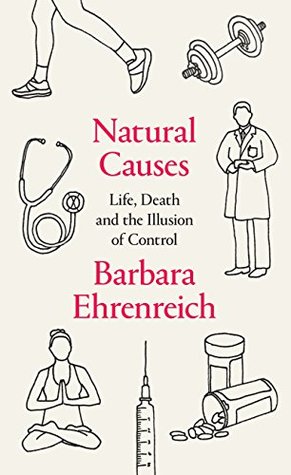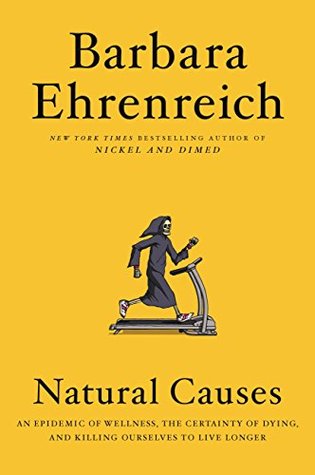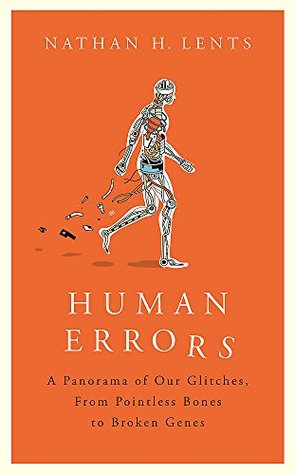Two recent books about our flawed bodies and the ultimate pointlessness of trying to control them…
Natural Causes: Life, Death and the Illusion of Control by Barbara Ehrenreich
 A decade ago, Barbara Ehrenreich discovered a startling paradox through a Scientific American article: the immune system assists the growth and spread of tumors, including in breast cancer, which she had in 2000. It was an epiphany for her, confirming that no matter how hard we try with diet, exercise and early diagnosis, there’s only so much we can do to preserve our health; “not everything is potentially within our control, not even our own bodies and minds.” I love Ehrenreich’s Smile or Die (alternate title: Bright-Sided), which is what I call an anti-self-help book refuting the supposed health benefits of positive thinking. In that book I felt like her skeptical approach was fully warranted, and I could sympathize with her frustration – nay, outrage – when people tried to suggest she’d attracted her cancer and limited her chances of survival through her pessimism.
A decade ago, Barbara Ehrenreich discovered a startling paradox through a Scientific American article: the immune system assists the growth and spread of tumors, including in breast cancer, which she had in 2000. It was an epiphany for her, confirming that no matter how hard we try with diet, exercise and early diagnosis, there’s only so much we can do to preserve our health; “not everything is potentially within our control, not even our own bodies and minds.” I love Ehrenreich’s Smile or Die (alternate title: Bright-Sided), which is what I call an anti-self-help book refuting the supposed health benefits of positive thinking. In that book I felt like her skeptical approach was fully warranted, and I could sympathize with her frustration – nay, outrage – when people tried to suggest she’d attracted her cancer and limited her chances of survival through her pessimism.
However, Natural Causes is so relentlessly negative and so selective in the evidence it provides that, even though it’s sure to be considered for next year’s Wellcome Book Prize longlist, I would be unlikely to recommend it. In the first chapter, “Midlife Revolt,” which has been excerpted at Literary Hub and is worth reading, Ehrenreich writes of her decision to give up routine medical screening after a false positive mammogram caused undue stress. She decided once she passed 70 she was old enough to die without accepting a “medicalized life.” Moreover, she believes there’s an epidemic of “overdiagnosis,” especially in the USA, where there can be a profit motive behind testing. (This is certainly not the case in the UK, where the NHS doesn’t pester me about getting cervical smear tests to line any pockets; no, it’s about saving taxpayers money by catching cancer early and thus minimizing treatment costs.)

I love the U.S. cover. (Note the different subtitle.)
Ehrenreich goes on to argue that many medical procedures are simply rituals to establish patient trust, that cancer screening is invasive and ineffective, that there is little evidence that meditation does any good, and that fitness has become a collective obsession that probably doesn’t help us live any longer. It’s uncomfortable to hear her dismiss early detection techniques as worthless; no one whose doctor found cancer in the early stages would agree. The author also seems unwilling to confront her own personal prejudices (e.g. against yoga).
Although she uses plenty of statistics to back up her points, these usually come from newspapers and websites rather than peer-reviewed journals; only in two chapters about how macrophages ‘betray’ the body by abetting cancer does she consult the scientific literature, in keeping with her PhD in cellular immunology. Her most bizarre example of how our bodies aren’t evolutionarily fit for purpose is copious menstruation. Overall, the book is a strange mixture of hard science, social science, and, in later chapters, philosophy, as Ehrenreich asks about the nature of the self and the soul and what survives of us after death. As usual, her work is very readable, but this doesn’t match up to many other mind/body books I’ve read.
Favorite lines:
“The only cure for bad science is more science, which has to include both statistical analysis and some recognition that the patient is not ‘just a statistic,’ but a conscious, intelligent agent, just as the doctor is.”
“The objection raised over and over to any proposed expansion of health insurance was, in so many words: Why should I contribute to the care of those degenerates who choose to smoke and eat cheeseburgers? … we persist in subjecting anyone who dies at a seemingly untimely age to a kind of bio-moral autopsy: Did she smoke? Drink excessively? Eat too much fat and not enough fiber? Can she, in other words, be blamed for her own death?”
My rating: 
Natural Causes was published in the UK by Granta on April 12th. My thanks to the publisher for the free copy for review.
Human Errors: A Panorama of Our Glitches, from Pointless Bones to Broken Genes by Nathan H. Lents
 Lents is a biology professor at John Jay College, City University of New York, and in this, his second book, he explores the ways in which the human body is flawed. These errors come in three categories: adaptations to the way the world was for early humans (to take advantage of once-scarce nutrients, we gain weight quickly – but lose it only with difficulty); incomplete adaptations (our knees are still not fit for upright walking); and the basic limitations of our evolution (inefficient systems such as the throat handling both breath and food, and the recurrent laryngeal nerve being three times longer than necessary because it loops around the aorta). Consider that myopia rates are 30% or higher, the retina faces backward, sinuses drain upwards, there are 100+ autoimmune diseases, we have redundant bones in our wrist and ankle, and we can’t produce most of the vitamins we need. Put simply, we’re not a designer’s ideal. And yet this all makes a lot of sense for an evolved species.
Lents is a biology professor at John Jay College, City University of New York, and in this, his second book, he explores the ways in which the human body is flawed. These errors come in three categories: adaptations to the way the world was for early humans (to take advantage of once-scarce nutrients, we gain weight quickly – but lose it only with difficulty); incomplete adaptations (our knees are still not fit for upright walking); and the basic limitations of our evolution (inefficient systems such as the throat handling both breath and food, and the recurrent laryngeal nerve being three times longer than necessary because it loops around the aorta). Consider that myopia rates are 30% or higher, the retina faces backward, sinuses drain upwards, there are 100+ autoimmune diseases, we have redundant bones in our wrist and ankle, and we can’t produce most of the vitamins we need. Put simply, we’re not a designer’s ideal. And yet this all makes a lot of sense for an evolved species.
My favorite chapter was on the inefficiencies of human reproduction compared to that of other mammals. Infertility and miscarriage rates are notably high, and gestation is shorter than it really needs to be: because otherwise their heads would get too big to pass through the birth canal, all babies are effectively born premature, so are helpless for much longer than other newborn mammals. I also especially liked the short section on cancer, which would eventually get us all if we only lived long enough. As it is, “evolution has struck an uneasy balance with cancer. Mutations cause cancer, which kills individuals, but it also brings diversity and innovation, which is good for the population.”
Lents writes in a good conversational style and usually avoids oversimplifying the science. In places his book reminded me of Kathryn Schulz’s Being Wrong and Mark O’Connell’s To Be a Machine. It’s a wry and gentle treatment of human weakness; the content never turns depressing or bitter. Recommended for all curious readers of popular science.
Favorite lines:
“While lithopedions [“stone babies”] and abdominal pregnancies are quite rare, they are also 100 percent the result of poor design. Any reasonable plumber would have attached the fallopian tube to the ovary, thereby preventing tragic and often fatal mishaps like these.”
“to call our immune system perfectly designed would be equally inaccurate. There are millions of people who once happily walked this planet only to meet their demise because their bodies simply self-sabotaged. When bodies fight themselves, there can be no winner.”
My rating: 
Human Errors was published in the UK by Weidenfeld & Nicolson on May 3rd. My thanks to the publisher for the free copy for review.
The Ehrenreich sounds as if it needs to be treated with exreme care. Your point about different health care systetems is a very salient one.
LikeLiked by 1 person
I can see how the book might be a necessary dose of scepticism for American readers, but I don’t think it translates over here particularly well. I expected it to be more about our extended life span and how we try to cheat and deny death (in keeping with books by Atul Gawande and Kathryn Mannix, perhaps). Blake Morrison’s review in the Guardian is nicely balanced: he takes issue with many of her points but lauds her general approach.
LikeLiked by 1 person
The Natural Causes one sounds really quite mistaken and dangerous, what a shame. Some very few tests have been manipulated, .e.g. I acquired high blood pressure by having the same blood pressure but the line over which it’s considered high moving, and a doctor did admit it was easier then to get mine down than a dangerously high person’s. But apart from that, I agree with you and not her totally.
Human error sounds fascinating. While I’m never going on a paleo diet any time soon, I was fascinated that when I started running marathons my body went mad storing fat even though I was very carefully not over compensating for the extra running and in fact eating very healthily – I put it down to my body reverting to earlier times, thinking we were migrating and piling on the fat to support us! Each time it went as I exercised less after the big day and on the third time I’d obviously adapted as it didn’t happen.
Thanks again for reading such interesting books and reviewing them with such clear eyes!
LikeLiked by 1 person
It’s really interesting to hear your perspective from running and having ‘high’ B/P. He talks about athletes’ ACL injuries as a particular sign of the knee joint not being very well designed.
LikeLiked by 1 person
I’ve heard similar criticisms of this book in a lot of different reviews. The book sounds interesting, but also annoying and surprisingly ignorant. It’s too bad! I’ll probably skip it…
LikeLiked by 1 person
I had a few moments where I thought “I can’t believe she said that!” An editor could have encouraged her to at least acknowledge differing opinions, even if just to refute them. It’s a shame because I’ve enjoyed a couple of her books before, but her last two have not been great. (The other recent one is about her religious experiences.)
LikeLike
These two books would spark heated discussions, I think. They would probably make me depressed as well. But there must be some nuggets of truth.
Sent from my iPhone
>
LikeLike
Yes, Ehrenreich’s book, especially, will be divisive. I didn’t find the Lents book depressing at all because he writes in such an entertaining fashion.
________________________________
LikeLike
I won’t read the Ehrehreich book then! I like the sound of the Letts though. I’m reading Sue Black’s book. A Life in Death: All That Remains at the mo – very good so far – a good blend of memoir and fact (she’s a forensic anthropologist), I’d expect this to be Wellcome-longlisted next yr.
LikeLiked by 1 person
She’s a very well-respected journalist and activist, but I don’t think this will rank among her better books.
I have a copy of Sue Black’s book too, and will hope to read it in the next month or so. Glad to see you’re thinking about next year’s Wellcome Prize already 🙂
LikeLike
Your review of Natural Causes lets me know I probably wouldn’t enjoy it. I have to say I’m a HUGE proponent of yoga, only in that it makes me FEEL good, mentally and physically. I’ve become quite addicted to it lately, actually. I don’t know if it makes me physically healthier but my posture is better and it helps me with anxiety and self-esteem. Same with meditation. But to each her own!
LikeLiked by 1 person
I’ve enjoyed my two yoga courses, and I do think they helped me with balance and posture, which are even more important as one ages. So it’s too bad that Ehrenreich is completely down on yoga and meditation. She admits she’s a gym nut, though she’s uncomfortable with language about “crushing your body.”
LikeLiked by 1 person
I’m very curious about this one (the Ehrenreich). Her very matter-of-fact tone and journalistic style can slip into abrasiveness at times. Even the books of hers I’ve most enjoyed have often found me shaking my head at her daring or simply at the way she expresses certain observations. As a general note, though, I do find aspects of the cult of wellness mind-boggling. So many people working so hard (and paying out so much money) on trends and quick-fixes, rather than simply making simple habit changes which would suit them as individuals (even if not trendy).
LikeLiked by 1 person
She’s definitely a prickly one. I loved Smile or Die, and Nickel and Dimed is good too, but this and her previous book have grated. Here it was the negativity that bothered me: she tears down so many things, but doesn’t suggest much in their place. And while there are definitely absurdities and inefficiencies that needed to be called out, the situation isn’t always as black and white as she makes it sound.
LikeLike
She does come across very matter-of-fact and I remember, even back with Nickel and Dimed, often wanting just a little more elaboration on certain things so I could situate myself in the scene, just figure out *if* I was likely to agree or disagree. But I’ve also had the feeling that she is heavily edited because no matter how “big” the topic, the books are usually pretty lean. Like read-them-in-a-single-afternoon lean. I’ve read three and I have always learned something, But I’ve lost track of her in recent years (while obsessing about various fiction reading projects), so I should take another look. I don’t recognise Smile or Die, but I think I remember a book about optimistic thinking that might have had a different title over here?
LikeLike
It was called Bright-Sided in the States, so presumably in Canada as well.
LikeLike
From what you say about the first one, it sounds like it would make me mad. I like to think I have some control over my health, even if not as much as I would like. On the other hand, I find I’m strangely curious to know what she thinks.
The second book sounds right up my alley – I love curious facts about the body!
LikeLiked by 1 person
Thank you very much for your nice review and feedback! I’m very glad that you enjoyed the book.
LikeLiked by 1 person
You’re welcome. I’m still working on getting an interview venue.
LikeLike
I was initially intrigued by the Ehrenreich but it sounds like I would have issues with it. Human Errors sounds good, though!
LikeLiked by 1 person
It’s a tough one: she says some important things that needed to be said, but then she also goes way out there in some respects!
LikeLiked by 1 person
[…] Natural Causes by Barbara Ehrenreich: Questioning the wellness culture […]
LikeLike
[…] zealous overscreening and overtreatment (he’d have an ally there in Barbara Ehrenreich: see her Natural Causes) and the tricky issue of getting consent from teenagers. He also recreates individual cases that […]
LikeLike